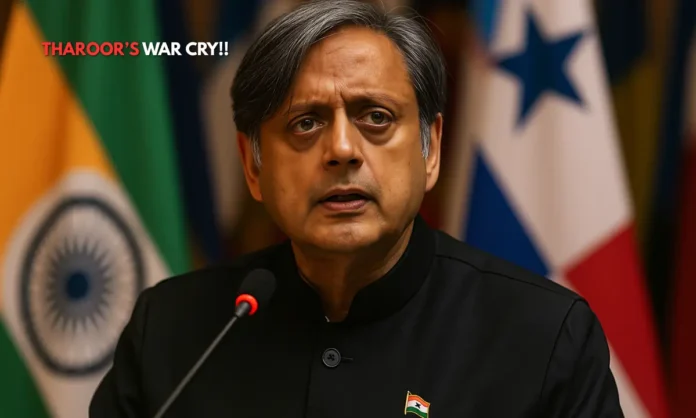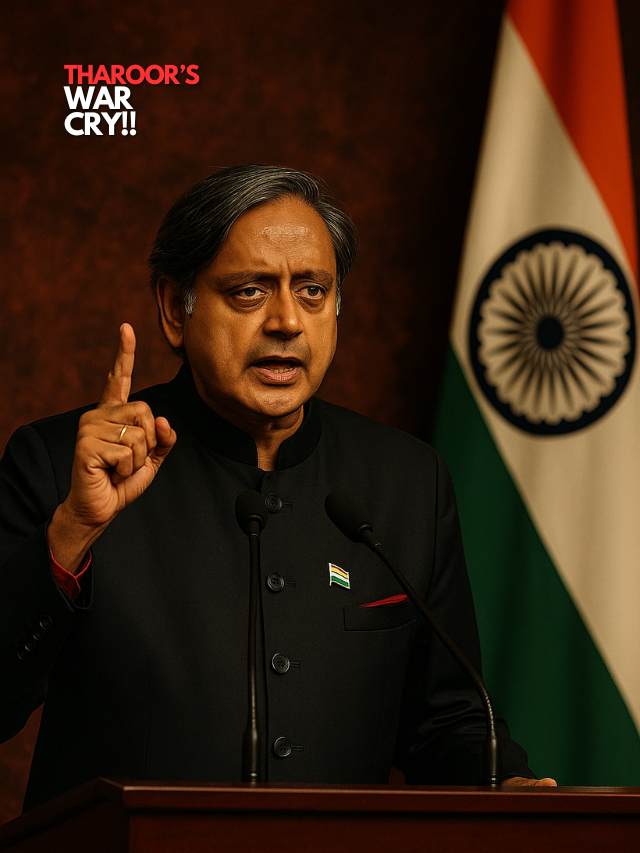Summary
- Congress MP Shashi Tharoor says India will not “turn the other cheek” in response to future terror attacks by Pakistan.
- Speaking in Panama, he condemned Pakistan Army officials for attending funerals of terrorists killed in Operation Sindoor.
- Tharoor invoked Mahatma Gandhi’s legacy of fearless resistance and called for global unity against terrorism.
Panama Platform, Indian Resolve: Shashi Tharoor’s Global Message After Operation Sindoor
Speaking from the heart of Central America, Shashi Tharoor—Congress MP and author-diplomat—used the global spotlight in Panama to reassert post-Sindoor anti-terror doctrine of India. “Even the land of Mahatma Gandhi will not turn the other cheek,” he declared, referring to India’s military retaliation after the Pahalgam terror attack that killed 26 civilians. The multi-party delegation led by Tharoor met with Panamanian President Jose Raul Mulino, but the headlines belonged to his unflinching remarks.
Tharoor’s words marked a symbolic escalation—not just a domestic consensus against terrorism, but an international campaign to call out what he called the “cynical objectives” of the Pakistani military. With Operation Sindoor still fresh in diplomatic memory, Tharoor is clearly positioning India’s response as not only justified but inevitable if future attacks continue.
Drawing from Mahatma Gandhi’s legacy, Tharoor walked a deliberate rhetorical tightrope: balancing the moral high ground with a message of hard deterrence. His remarks aren’t just political statements—they’re part of India’s post-Sindoor messaging offensive, signaling to both allies and adversaries that restraint has its limits.
Indian delegation led by @ShashiTharoor
— Ayushi Agarwal (@ayu_agarwal94) May 28, 2025
during the meeting with the Foreign Minister of Panama, while highlighting Pakistan's state support for terrorism , presents the viral photograph showing Pakistani Army officers attending the funeral of terrorists. pic.twitter.com/QJt38obs3G
Target: Terror and Its Enablers — Tharoor’s Sharp Rebuke of Pakistan’s Military
- Tharoor accused senior Pakistani officials of attending the funeral of terrorists killed in India’s Operation Sindoor.
- He claimed the funeral was attended by individuals sanctioned by the United Nations.
- His message: Pakistan can’t deny involvement while publicly mourning designated terrorists.
One of the most powerful elements of Tharoor’s address was not just the reaffirmation of India’s right to retaliate—but the scathing indictment of Pakistan’s duplicity. He described the funeral of those killed in India’s Operation Sindoor strikes—terror infrastructure eliminated in retaliation for Pahalgam—as a political act in itself. According to Tharoor, top Pakistani Army and police officials were in attendance, including individuals blacklisted by the United Nations.
“This is the country that now says we are innocent. We did not do it. You do not mourn for people you do not know,” Tharoor stated, adding a piercing layer of hypocrisy to Pakistan’s official denials.
This framing goes beyond tit-for-tat politics. It’s an effort to de-legitimise Pakistan’s denials at the international level, especially in forums where moral equivalency is often peddled. Tharoor’s remarks strengthen India’s narrative that state complicity, not just rogue militancy, lies at the heart of cross-border terror.
Terrorism’s Real Target: Kashmir’s Economy and India’s Global Image
- Tharoor said the Pahalgam attack was aimed at derailing Kashmir’s tourism-led economic recovery.
- He quoted Indian diplomats noting that Pahalgam had more tourists than Aspen, Colorado.
- The delegation’s broader message: terrorism isn’t just a security threat—it’s economic sabotage.
Tharoor’s remarks also highlighted the economic dimension of terrorism—a less-discussed but critical element. The Pahalgam massacre, he argued, wasn’t just an attack on civilians; it was an attempt to derail the booming tourism economy in Jammu and Kashmir. Quoting Indian Ambassador to Washington, he noted that “there were more tourists in Pahalgam than in Aspen.”
The framing is strategic: it positions terrorism as not merely an act of ideological violence but as a targeted assault on Indian prosperity. Tharoor’s insight is that economic vibrancy—especially in formerly conflicted regions—threatens the narrative propagated by Pakistan-based groups.
By invoking the economic stakes, Tharoor shifts the focus from just casualties to long-term strategic disruption. It’s an attempt to internationalise terrorism not as a “border issue” but as a destabilising act with consequences far beyond Kashmir.
The Gandhi Doctrine Reimagined: No Fear, No Tolerance
Shashi Tharoor’s invocation of Mahatma Gandhi wasn’t accidental—it was calibrated. In quoting Gandhi’s message of living “without fear,” he built a bridge between India’s moral roots and its modern security doctrine. Gandhi taught resistance with dignity; Tharoor argues that today, that means resisting terror with resolve.
His line—“Even the land of Mahatma Gandhi will not turn the other cheek”—is not just rhetorical flair. It marks the ideological evolution of India’s response to terrorism. The transformation is clear: from restraint to retaliation, from dossiers to deterrence.
As India continues its global diplomatic outreach post-Operation Sindoor, the Panama speech sends a clear message. The old rules of symbolic condemnation are over. Now, every attack will meet a response—not just militarily, but through global narratives and economic counterweights. India is not asking for permission; it is setting the terms.



